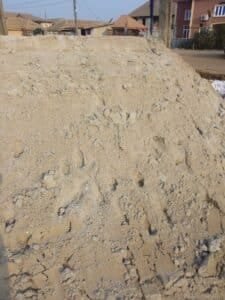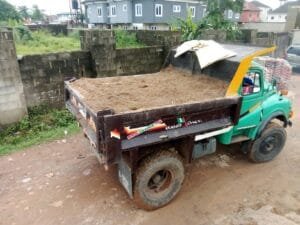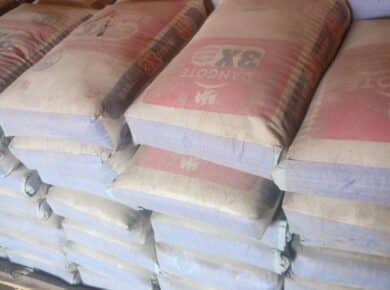The price of sand per 1 trip in Nigeria depends on whether it’s sharp sand, filling sand, plaster sand and soft sand. Sand is an essential component in building construction. It plays a huge role in everything from building foundations to plastering walls. Prices of sand fluctuates from time to time due to factors such as demand, location and cost of transportation.
Are you a builder, constructor, or investor? Being aware of the market trend can help you make informed purchasing decisions. Economic conditions seasonal changes, and supply chain disruptions may also be contributing factors to the price of sand in Nigeria.
The purpose of this blog post is to keep you updated on the latest sand prices in Nigeria. More so, if you must purchase sand, it is important that you stay updated on current prices and factors that may affect them. That being said, let’s get started, shall we?
Importance of Sand in Building Construction
Sand plays a crucial role in building construction. Strength, durability, and stability are key features of sand in buildings. Here are five reasons why sand is important in construction:
1. Strength and Stability
As a key component of concrete and mortar, sand provides strength and stability to buildings. Bonding cement with aggregates and ensuring that the construction is firm and durable are just a few attributes of good sand.
Hence, it is safe to say the strength of the structure is proportional to the quality of sand used directly.
2. Workability and Smooth Finish
Sand improves the workability of concrete and plaster, making it easier to apply and shape to what best fits. Even texture, and smooth finish, you name it, which is essential for aesthetic appeal and structural integrity are just a few of what sand does in construction.
3. Drainage and Moisture Resistance
By improving drainage in foundations, sand helps to prevent water from accumulating in foundations and concrete mixtures. Sand increases the longevity of buildings by reducing the chances of cracks due to moisture retention.
4. Cost-Effective Construction Material
Sand is obviously one of the most economical building materials, in essence, making construction affordable. Since it is always readily available, the overall cost of concrete and plaster is reduced and it sometimes can replace expensive materials like cement.
Types of Sand

Sand is a major building material used in construction, landscaping, manufacturing and what have you. Different types of sand serve various purposes.
This could depend on the composition and grain size. Listed below are the three types of sand. They include sharp sand, plaster sand, and filling sand.
Sharp Sand

Another name for sharp sand is grit sand or concreting sand. This type of sand has a coarse texture with irregular, jagged particles.
In construction, sharp sand can be used for making concrete, laying paving slabs, and improving soil drainage in gardening.
Its tough texture makes it ideal for foundations and other load bearing applications plus it provides a strong bonding structure.
Plaster Sand
Plaster sand is best known for its fine, smooth textured sand. It is used primarily for plastering ceilings and walls. Its smaller, more rounded particles allows for a smooth finish when mixed with cement.
Plaster sand ensures a high quality, even surface on walls and is best for brick laying mortar. It is an ideal sand type for indoor and outdoor plastering applications because it is washed and filtered to remove impurities.
Filling Sand
Also known as utility or builder’s sand, filling sand as the name implies is a good choice for filling voids, level surfaces, and provides stable base for construction projects.
Trench filling, back filling foundations and compacting under concrete slabs are mostly made up of filling sand.
While this type of sand may not be as refined as sharp or plaster sand, it still provides excellent compaction properties and is a great option for preventing shifting or settling over time.
It is worth noting that each of the types of sand featured in this post has distinct properties that make it suitable for specific applications. Think of stability, and high quality finish in construction and landscaping projects, there’s a sand type to cater to your needs.
Soft Sand
This type of sand has a very fine and smooth feel. It’s used for screeding, plastering and as mortar sand during building construction. This is why it’s referred to as bricklayer’s best sand. It’s very soft and it’s known for it’s strength.
Price of Sand in Nigeria Per Trip

The cost of a trip of sand in Nigeria varies from area to area so it is difficult to pinpoint. However, we’ve made an extensive search and from the information we have so far, prices for sharp sand are between N4,000 to N9,000 per ton, N18,000 to 27,000 per 5 tons.
The prices for 10 tons of sharp sand is anywhere from N35,000 to N45,000 depending on location, and N70,000 to N105,000 for 20 tons. In Lagos, sand is more expensive in the Island than Mainland. Have in mind that the type, quantity and location of the dealer are major contributing factors on the prices you may be offered.
Filling or plaster sand are usually more affordable. The price of filling sand per ton is between N2,000 to N6,000, N10,000 to 17, 000 for 5 tons. Meanwhile, 20 tons of sand could cost anywhere between N40,000 to N52,000. This does not include cost of transportation.
- Sharp sand: 45,000 per 10 tons trip
- Plaster sand: 35,000 per 10 tons trip
- Filling sand: 34,000 per 10 tons trip
- Soft Sand: 30,000 per 10 tons trip
To further add, places like Lagos and Onitsha, prices of sand are affected by local market conditions. The above prices does not include transportation to your destination. So these prices are on-site prices.
ALSO READ: Price of 6 inches and 9 inches Blocks in Nigeria
Wrap Up
The type of sand you choose for your building construction is very important. What to look out for is structural strength, smooth finishing, and proper drainage. With all these in store, you are on track.
Sharp sand is ideal for concrete and foundations, plaster sand ensures a refined surface, whereas for stability, filing sand may be your best bet. To get the best value for your money compare suppliers, quality, and common factors that can affect costs like transportation.









